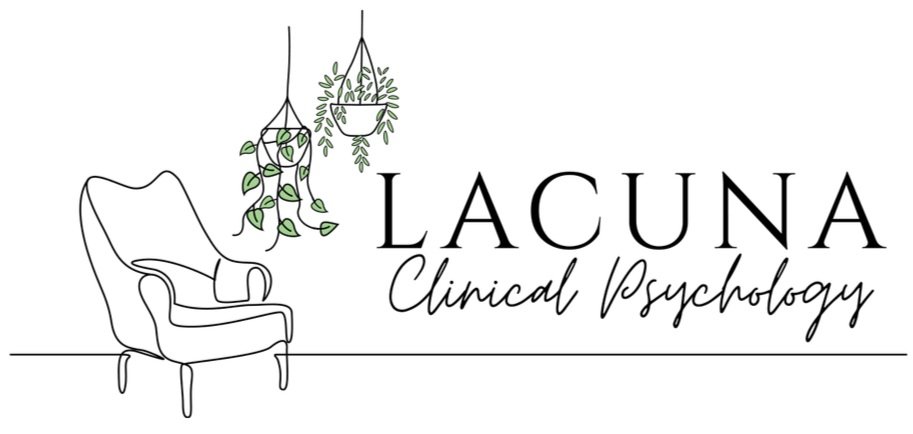Feel, process, heal
Emotion focused talk therapy
The benefits of emotion based therapy
Our therapists provide evidence-based therapy focused on emotional depth. Here’s what that means and how it can help:
Connect with your emotions: Therapy helps you process your emotions, rather than avoiding or suppressing them. By connecting more deeply with your feelings, you can develop a greater understanding of what drives your actions, habits, and reactions. Emotions are like a compass that can guide us toward what is meaningful in our life, but suppression and avoidance can block us from this important information.
Reduce anxiety and psychological distress: Our approach emphasises anxiety regulation. First helping you to regulate your anxiety in session and in your life, and then learning the underlying emotional factors getting you anxious so that you can reduce anxiety in the long-term. .
Break unhelpful patterns: Therapy at Lacuna will help you recognise and disrupt automatic, unhelpful emotional patterns that may have developed over time, promoting healthier responses to life’s challenges.
Build resilience and emotional health: By strengthening your connection to your emotions and reducing reliance on defense mechanisms, therapy fosters emotional resilience. This resilience can empower you to handle future stress with greater ease and confidence.
Experience authentic relationships : As you become more attuned to your own feelings, therapy can also enhance your capacity for intimacy, empathy and openness in relationships. By fostering emotional honesty, healthier and more satisfying relationships become possible.
Ready to get started?
FAQs about therapy
-
Our Clinical Psychologists have training and experience for wide-range of psychological difficulties:
Anxiety
Depression
Trauma and PTSD
Addiction
Personality disorders
Relationship problems and breakdowns
Eating disorders
Somatic problems and medically unexplained pain
If your difficulties are related to emotions, emotional avoidance or emotional connection in relationships, we can help.
If you are unsure if we can help, send us a message.
-
Every person is different. We aim for therapy to provide benefits as quickly as possible. Most people start to experience some relief in their first few appointments.
We find therapy works best when you attend weekly or fortnightly.
If you have a Mental Health Care Plan you can access up to 10 sessions in a calendar year with a Medicare Rebate. -
All our psychologists have a Masters or Doctorate Degree in Clinical Psychology and some have a PhD as well.
Most of our psychologists have also completed an additional three year training program in Intensive Short Term Psychodynamic Therapy (ISTDP). -
Psychodynamic Therapy (ISTDP): This approach focuses on helping you understand and work through deep emotions that may be causing stress or anxiety, or giving you somatic responses such as a racing heart, shaking hands, etc. It’s based on the idea that unresolved feelings can drive mental health issues, so by facing and processing these emotions, you can find lasting relief.
Thought/Behavior-Based Therapies (CBT and ACT): These therapies focus on changing unhelpful thoughts or behaviors to improve how you feel. CBT helps you identify and challenge negative thinking patterns, while ACT encourages accepting your thoughts and feelings and committing to actions that align with your values.
In short, ISTDP aims to resolve core emotional issues (that are often unconscious) for deeper change, while CBT and ACT focus on managing symptoms by changing conscious thoughts and behaviors.
Understanding Mental Health
How to Get a Mental Health Care Plan (MHCP) in Newcastle
A step-by-step guide to getting and using Medicare-rebated sessions at Lacuna Psychology.
What is the Best Type of Therapy for Anxiety?
Research shows Psychodynamic therapy, a type of therapy that deals with the underlying emotions driving anxiety, is highly effective for long lasting relief.
ADF Members, Veterans and their Families can see a Psychologist at Lacuna at No Cost
A simple guide to accessing fully funded therapy at Lacuna Psychology through Open Arms and DVA
The 5 Hidden Ways Emotions Impact Your Body
How your emotions and anxiety can impact your body in unexpected ways.
What to Expect from your First Psychology Session at Lacuna
This guide walks through your first therapy session —from parking and referrals to discussing your concerns to creating a plan for therapy.
Why do I Struggle in relationships?
How your patterns from childhood affect your adult relationships and what you can do about it.









